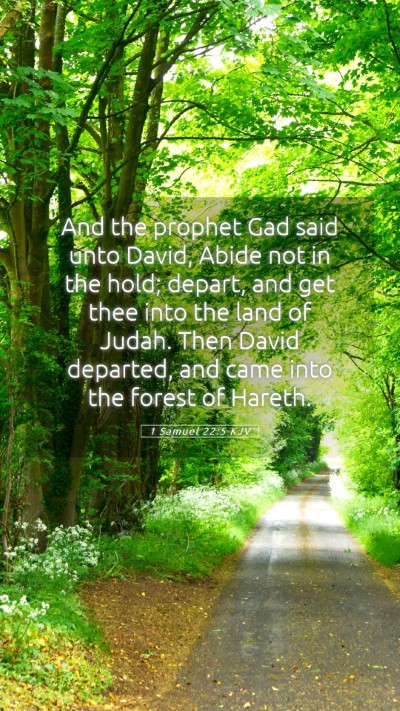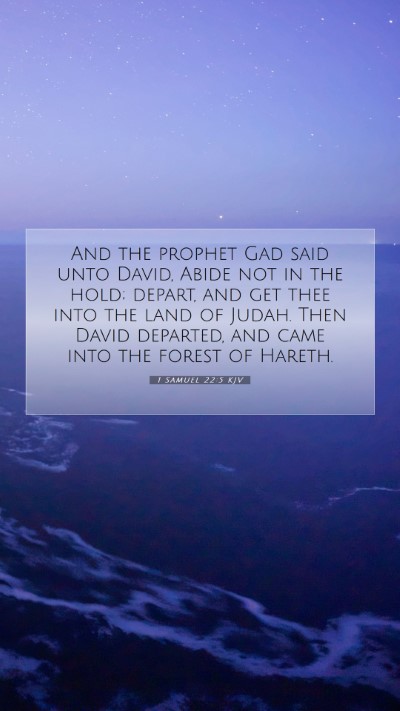Understanding 1 Samuel 22:5: A Comprehensive Bible Verse Commentary
The verse 1 Samuel 22:5 reads: "And the prophet Gad said unto David, 'Abide not in the hold; depart, and get thee into the land of Judah.' Then David departed, and came to the forest of Hareth." This passage carries significant implications and offers a wealth of insights into David's journey, leadership, and relationship with God. Below, we analyze this verse using perspectives from esteemed public domain commentators such as Matthew Henry, Albert Barnes, and Adam Clarke.
Contextual Overview
This verse occurs during a crucial period in David's life when he is fleeing from King Saul, who seeks to kill him. Gad, the prophet, serves as God's messenger, guiding David during this tumultuous time. Understanding the background of this passage enhances our comprehension of its meaning and its relevance in Scripture.
Insights from Matthew Henry
David's Refuge: According to Matthew Henry, this verse illustrates David's need for direction amidst peril. His retreat to the hold signifies a temporary refuge, yet the prophet Gad's directive indicates that God's plans require action. Henry emphasizes the importance of obedience to divine guidance, especially in times of trial.
The Role of the Prophet: Henry further highlights the pivotal role of prophets in Israel. Gad’s instructions were a means through which God communicated His will to David. This highlights how God provides guidance through chosen vessels, encouraging believers to seek divine direction in their lives.
Analysis by Albert Barnes
Geographical Significance: Albert Barnes notes the geographical implications of David's journey. His movement to the land of Judah signifies a return to his roots and the territory that belonged to his tribe. Barnes argues that this reflects the theme of restoration that runs throughout the biblical narrative, indicating that God’s plans often involve redeeming individuals and situations.
Interpretative Applications: Barnes also interprets this passage as a call to believers not to remain stagnant in times of difficulty but to actively seek God's will. His commentary suggests that David's transition from the hold symbolizes a movement towards safety and purpose, encouraging readers to trust in God’s guidance.
Clarke's Commentary
Symbolism of the Forest: Adam Clarke offers an intriguing symbolic interpretation of the forest of Hareth. He suggests it may represent spiritual growth and safety for David, akin to how trees provide shelter. This symbolizes how God often protects and nurtures His followers, leading them through their struggles.
Trusting God's Timing: Clarke emphasizes the essence of divine timing. David's eventual departure from the hold illustrates that though he experienced periods of seclusion and peril, God had a plan for his deliverance. Clarke encourages believers to trust that God’s timing is always perfect, even when circumstances seem dire.
Broader Implications for Believers
This verse resonates with several key themes relevant for contemporary believers:
- Seeking Divine Guidance: Just as David sought the guidance of Gad, believers are encouraged to seek God’s direction through prayer, Scripture, and the counsel of others.
- Response to God’s Call: David’s action in moving when instructed reflects the necessity of responsiveness to God’s call, prompting self-reflection on how one responds to divine nudges in daily life.
- God’s Provision in Trials: The narrative of David emphasizes that even in trials, God is actively working behind the scenes for our good, providing refuge and direction.
Cross References
1 Samuel 22:5 connects intriguingly with other biblical themes and passages, including:
- 1 Samuel 16:13: The anointing of David as king, illustrating his divine destiny.
- Psalm 27:1: David’s expression of faith in God as his light and salvation amidst adversity.
- 2 Samuel 5:1-3: David’s eventual recognition as king over all Israel, fulfilling God’s promises.
Conclusion: Reflecting on 1 Samuel 22:5
This verse encapsulates the profound relationship between God, His prophets, and His chosen leaders. The insights derived from Matthew Henry, Albert Barnes, and Adam Clarke highlight the importance of seeking and heeding divine guidance while also illustrating God’s faithfulness amidst trials. As believers explore the meaning of Bible verses, 1 Samuel 22:5 serves as a reminder of the continual support and direction that God offers to those who trust in Him. Understanding such passages not only enriches one's Bible study insights but also encourages application in daily circumstances, fortifying the faith of individuals and communities alike.


